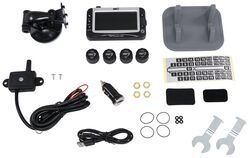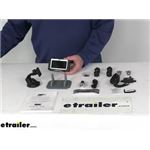
Correct Method For Adjusting Tire Pressure On Long Road Trips
Question:
I just finished a 1100 mile trip towing my 35’ 5th wheel RV. My trip started in Palm Desert Ca. Departure tire pressure was 80 psi max tire rating cold the temp was 100 degrees. I traveled to Bodega Bay where the temp was 65 max during the day. When I returned home 1 week later temp was 55, I checked the tire pressure beforehand and it was 70 psi all 4 tires. I brought tires up to 80 psi and departed, arriving back in Palm Desert that afternoon where temp was 110. TPMS showed tire pressures 95 to 98, and tire temp 117 to 122. When I put my rig up the following morning after sitting for 12 hrs. Tire pressure was 95 air temp 94. I raise the tires off the ground on trailer legs after which I reduced the tire pressure to 75 prior to installing my tire covers. Should I have done anything different to protect my tires.
asked by: Glenn K
Helpful Expert Reply:
TPMS systems, such as TST TPMS for RVs - Color Display - Signal Booster - 4 Tire Sensors # TST-507-RV-4-C, are usually very accurate in determining the tire pressure in your 5th wheel trailer. The correct way to set tire pressure is when the tires are cold before towing. It is normal for road heat to increase tire pressure and that is usually not a cause for concern so you wouldn't need to adjust after driving. However, if you are going from cold climates to extremely hot climates like you mentioned, then you will want to stop and allow the tires to cool down and adjust the pressures accordingly since the higher ambient temperatures will cause higher pressures.
It sounds like you did the right thing by frequently checking your tires. Just make sure you check and adjust them when driving on long trips through various climates as mentioned above.

Product Page this Question was Asked From
TST TPMS for RVs - Color Display - Signal Booster - 4 Tire Sensors
- TPMS Sensor
- RV
- Trailer
- Mounts to Valve Stems
- 4 Sensors
- Standard Sensors
- Water Resistant
- Monitor Display
- TST
more information >
Featured Help Information
Instructions
Miscellaneous Media

Continue Researching
- Q&A: Recommended 2" Trailer Hitch And Wiring Harness For A 2024 Toyota RAV4 Prime
- Q&A: Should Older Trailer Replace Breakaway Kit WIth One That Has Charger
- Q&A: How Do I Secure A Kayak To My Roof When There Are No Anchor Points On The Front Of My Vehicle?
- Q&A: What is Overall Weight Capacity of Kenda Karrier ST235/80R16 Radial Trailer Tire with 16" Black Mod
- Q&A: Which Jounce-Style Suspension Enhancement Should I Install On 2020 Chevy Silverado 1500 Non Mag Ride
- Q&A: Roof Rack for 2010 Dodge Grand Caravan with Naked Roof
- Q&A: Fit Kit For Thule Roof Rack on 2022 Ford F-250 and 2019 F-150 Crew Cabs
- Article: Trailer Tire Sizing
- Article: 7 Common Questions Everyone Has About Trailer Tires
- Article: Determining Trailer Tongue Weight
- Article: 5 Things to Know About Weight Distribution Hitches
- Article: How (and Where) to Connect an RV Propane Grill
- Article: How Much Trailer Can I Really Tow
- Article: 4 Steps to Choosing Your 5th Wheel Pin Box







Joseph S.
2/19/2024
That makes perfect sense.